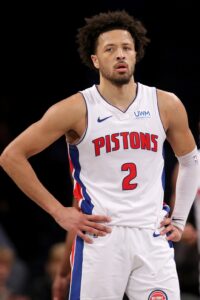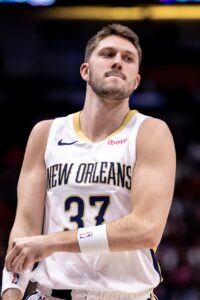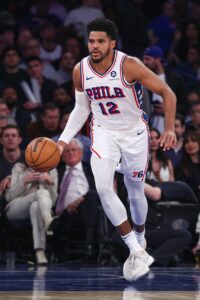Hoops Rumors is checking in on the 2024 offseason for all 30 NBA teams, recapping the summer’s free agent signings, trades, draft picks, departures, and more. We’ll take a look at each team’s offseason moves and consider what might still be coming before the regular season begins. Today, we’re focusing on the Detroit Pistons.
Free agent signings
Trades
- Acquired Tim Hardaway Jr., the Raptors’ 2025 second-round pick, the Heat’s 2028 second-round pick, and either the Clippers’ or Hornets’ 2028 second-round pick (whichever is least favorable) from the Mavericks in exchange for Quentin Grimes.
- Acquired Wendell Moore and the draft rights to Bobi Klintman (No. 37 pick) from the Timberwolves in a four-team trade in exchange for the draft rights to Cam Spencer (No. 53 pick; sent to Grizzlies).
Draft picks
- 1-5: Ron Holland
- Signed to rookie scale contract (four years, $37,463,383).
- 2-37: Bobi Klintman
- Signed to four-year, $7,995,796 contract. First two years guaranteed. Third year non-guaranteed. Fourth-year non-guaranteed team option.
Two-way signings
Departed/unsigned free agents
Other moves
- Signed Cade Cunningham to a five-year, maximum-salary rookie scale extension that begins in 2025/26. Projected value of $224,238,150 (starting at 25% of the cap). Projected value can increase to $269,085,780 (30% of the cap) if Cunningham meets Rose Rule performance criteria.
- Claimed Paul Reed off waivers.
- Waived Troy Brown.
- Waived Buddy Boeheim (two-way).
Salary cap situation
- Operating under the cap ($140.6MM) and above the minimum salary floor ($126.5MM).
- Carrying approximately $130.3MM in salary.
- No hard cap.
- Full room exception ($8MM) available.
The offseason so far
After winning no more than 23 games for four straight seasons, the Pistons entered 2023/24 hoping to take a step forward under new head coach Monty Williams. Instead, the team endured one of the ugliest seasons in NBA history, compiling a franchise-worst 14-68 record and matching a league record by losing 28 consecutive games.
The Pistons responded by replacing general manager Troy Weaver with new head of basketball operations Trajan Langdon, a former player and a veteran executive who previously worked in New Orleans and Brooklyn. Langdon certainly wants to see better on-court results than Detroit had last season, but he also isn’t yet feeling any win-now pressure in his first year on the job, so his approach to the offseason blended moves that could help in the short term with future-minded transactions.
In free agency, the Pistons looked to add veteran leadership while upgrading their outside shooting after ranking among the NBA’s bottom five last season in three-pointers made and three-point percentage. There was some sticker shock when word broke that Tobias Harris had agreed to a two-year, $52MM contract with Detroit, but Harris is the sort of scorer and shooter the team needed in its frontcourt, and his deal isn’t lengthy enough to become a real burden on the club’s cap.
The Pistons also re-signed Simone Fontecchio (two years, $16MM) and brought in Malik Beasley (one year, $6MM), giving the team two more reliable marksmen on short-term deals.
 Harris, Fontecchio, and Beasley aren’t going to turn Detroit into a playoff team, but they’ll help open up the floor for franchise player Cade Cunningham to operate. After a lost 2022/23 season, Cunningham returned from a left leg injury and enjoyed a breakout year, with career highs in PPG (22.7), APG (7.5), FG% (.449), and 3PT% (.355).
Harris, Fontecchio, and Beasley aren’t going to turn Detroit into a playoff team, but they’ll help open up the floor for franchise player Cade Cunningham to operate. After a lost 2022/23 season, Cunningham returned from a left leg injury and enjoyed a breakout year, with career highs in PPG (22.7), APG (7.5), FG% (.449), and 3PT% (.355).
The former No. 1 overall pick is entering his age-23 season and will be playing on a roster a little better suited to his skill set, so it’s not unreasonable to expect him to reach a new level in 2024/25. The Pistons are certainly hoping for continued growth after giving him a five-year, maximum-salary rookie scale extension in July. That deal, which will go into effect in ’25/26, projects to be worth about $224MM, or up to $269MM if Cunningham takes a huge step forward and earns All-NBA honors next spring.
While additions like Harris and Beasley should help make the Pistons a more competitive team in the short term, some of Langdon’s other moves this summer were made with the long term in mind. Detroit acquired three future second-round picks and moved up 16 spots in this year’s second round by sending out Quentin Grimes and taking back Tim Hardaway Jr. (from Dallas) and Wendell Moore (from Minnesota) in salary-dump deals.
It’s possible none of those four second-round picks (including this year’s No. 37 selection Bobi Klintman) will yield a better NBA player than Grimes, but Langdon and his new front office clearly weren’t committed enough to the former Knick to pay up for his next contract (Grimes is rookie scale extension-eligible this offseason). And while Hardaway was a salary dump from the Mavericks’ perspective, he figures to play a rotation role in Detroit in 2024/25 after making 37.5% of his three-point tries over the past five seasons.
The Pistons’ lottery selection, No. 5 overall pick Ron Holland, is another long-term investment for the organization — he turned 19 just last month and has a few areas of his game he’ll need to improve in order to earn regular rotation minutes as a rookie. Several mock drafts leading up to June’s event had Holland going outside the top 10, but Langdon was willing to bet on the young forward’s upside following an up-and-down year with the G League Ignite.
While the Pistons’ selection of Holland was unexpected, it may not have been the most surprising move made in Detroit this summer. A year after signing what was – at the time – a record-setting contract for an NBA head coach, Williams was dismissed with five years and well over $60MM still left on that six-year deal.
It’s rare for NBA teams to eat that much money and give up on a head coach so soon, but it’s a credit to club owner Tom Gores that he was willing to write that check and let Langdon make his own hire. The Pistons brought in former Cavs head coach J.B. Bickerstaff, who showed in Cleveland that he’s capable of turning a young team into a perennial playoff club.
Up next
The Pistons are the only NBA team with any cap room remaining — they have just over $10MM still available.
Theoretically, with one spot still open on the team’s projected 15-man roster, that money could be used to pursue a free agent. But Cavs restricted free agent Isaac Okoro is the only unsigned player likely to earn significantly more than the veteran’s minimum, and there has been no indication Detroit is pursuing him.
There’s no urgency for the Pistons to use their cap room immediately, so the front office will likely remain patient and stay on the lookout for ways it could come in handy. That could mean accommodating another salary dump to acquire more draft assets, like they did with Hardway and Moore. It could also mean claiming a player off waivers, like they did last month with big man Paul Reed. If no favorable opportunities arise this fall, Detroit could carry that cap room into the season and use it to make a midseason deal.
In addition to their open 15-man roster spot, the Pistons have one two-way slot available.
As for extension candidates, Hardaway is the only player eligible for a new deal now that Cunningham has been locked up. I don’t expect extending the veteran wing will be a preseason priority for Detroit — if he performs well during the season, the team could always explore a possible extension for Hardaway anytime up until June 30.
 1:19pm: The Pelicans plan to waive sharpshooter
1:19pm: The Pelicans plan to waive sharpshooter 
 Harris, Fontecchio, and Beasley aren’t going to turn Detroit into a playoff team, but they’ll help open up the floor for franchise player
Harris, Fontecchio, and Beasley aren’t going to turn Detroit into a playoff team, but they’ll help open up the floor for franchise player